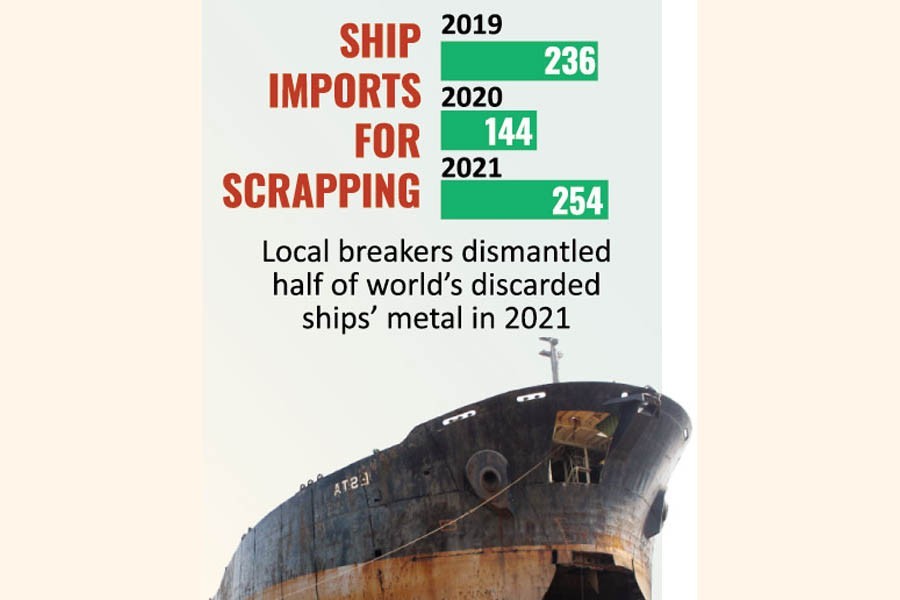Bangladesh annually imports the highest number of scrap ships to provide vital backward linkage to booming steel and re-rolling industries, thus holding top global position.
Such ranking as leading scrapped-vessel breaker comes from a global coalition, as the country imported last year for dismantling 254 ships, in a 76- per cent year-on-year rise.
However, rights groups lament both human and environmental hazards associated with shipbreaking globally. Owners in Bangladesh say safeguards have been in place and accidents are on the wane.
During the January-December period of 2020 -- the year under corona onslaught -- the country brought 144 scrapped ships, down from 236 imported in 2019, according to the data released by NGO Ship-breaking Platform (NSP).
It reveals that last year, the shipbreaking industry handled 16,014,464 tonnes of metal around the world. About 8,036,554 tonnes were dismantled on the shore in Chattogram in the past year.
The NSP is a global coalition of organisations working to reverse the environmental harm and human rights abuses caused by current shipbreaking practices and to ensure the safe and environmentally-sound dismantling of end-of-life ships worldwide.
A total of 763 oceangoing commercial ships and offshore units were sold to the scrap yards in 2021, according to data released by NSP on February 02.
Of these, 583 of the largest tankers, bulkers, floating platforms, cargo- and passenger ships ended up on the beaches of Bangladesh, India and Pakistan, amounting to near totality of the gross tonnage dismantled globally.
Of those, 210 and 119 were dismantled in India and Pakistan, weighing 3,144,135 tonnes and 2,972,585 tonnes respectively, last year, it says.
Turkey dismantled 77 ships, followed by the European Union 37 and 66 from the rest of the world in 2021.
According to the NSP, at least 14 workers lost their lives last year while breaking apart vessels on the beach of Chattogram, Bangladesh, and another 34 were severely injured.
Citing local sources, it reported two deaths in Alang, India, and two in Gadani, Pakistan. Some of these accidents took place onboard vessels owned by well-known shipping companies, such as Berge Bulk, Nathalin Co, Polaris Shipping and Winson Oil.
"We have been witnessing this environmental and human rights scandal for too long. All ship owners are aware of the dire situation at the beaching yards and the lack of capacity to safely handle the many toxic materials onboard vessels. Yet, with the help of scrap dealers, the vast majority choose to scrap their end-of-life fleet in South Asia as that is where they can make the highest profits," the NGO Ship-breaking Platform statement quoted its executive director Ingvild Jenssen as saying.
In South Asia, workers -- often exploited migrants, some of them children -- are exposed to immense risks. Dangerous working conditions, including fires and falling steel plates, kill or seriously injure numerous workers. Many more are sickened by exposure to toxic fumes and substances that can be found within the ships' structures.
Coastal biomes, and the local communities depending on them, are devastated by toxic spills and air pollution for a lack of infrastructure to contain, properly manage and dispose of hazardous materials, it adds.
"The sector suffers from a serious lack of transparency, and it is expected that several accidents go unreported. Many more workers suffer from cancers and other occupational diseases, due to the long-term exposure to hazardous substances, including asbestos," says the platform's project officer, Sara Costa.
They have launched a fundraising campaign to help the victims of unregulated shipbreaking in collaboration with new local partners in Bangladesh, and urged people or companies to support so that proper medical treatment can be provided.
When asked, Bangladesh Ship Breakers and Recyclers (BSBA) president Abu Taher said they witnessed dull business in 2020 mainly due to the pandemic when import of scrapped ships declined significantly.
"But last year business was good and many ships were imported," he told the FE.
He, however, claims the number of accidents has declined in the industry due to the safety measures taken by the industry people.
There are 160 yards in the country while 70-80 are in operation, he said, adding that the shipbreaking industry creates direct and indirect employment for about 0.1 million workers.
According to industry-insiders, shipbreaking plays an important role in the national economy by supplying raw materials for local steel and light-engineering industries.
More than 300 re-rolling mills are using ship scraps as their raw materials while shipbreaking industry meets more than 60 per cent of the raw materials for local steel industry, they say.


